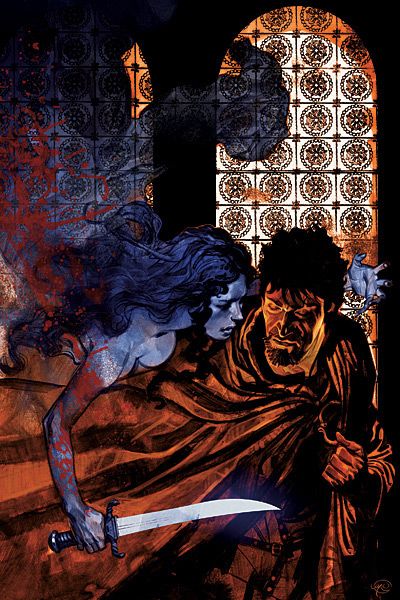Brian Wood's best-known works deal with New York City. As a chronicler of that town's energetic attitude within its oppressive structures, he has built himself a distinct and important niche in the comic book world. Yet "Northlanders," which requires that Wood imagine another continent 1,000 years in the past, might be his best work yet. With this comic, he doesn't have any city-dwelling tropes to fall back on and instead must find the humanity within the harsh barbarism of the 10th century. "Northlanders" stretches his storytelling, and allows him to escape the occasionally formulaic "coolness" to which his other work can succumb. "Northlanders" is a major work by a serious writer. If you've overlooked it so far, or find yourself wavering about picking up the inevitable trade, you owe it to yourself to look at it more closely. It may not have the immediately obvious high-concept appeal of "Fables" or "Y the Last Man," but it's right up there with "Scalped" as one of the new breed of Vertigo books. It's substantial and vibrant.
The first four issues established Sven, the prodigal son, whose return to the Orkney Islands has been filled with violence and injustice. Sven, as we find out in this issue, had a nearly perfect life in Constantinople -- the city into which he was sold as a slave over a decade before -- but something compelled him to return home, to leave the modern world of the Great City to return to the savagery of the Viking lands.
"Northlanders" #5 establishes the paradox of Sven, whose passivity in the barbaric Grimness Settlement caused him to be expelled from his family, and whose murderous deeds in "civilized" Constantinople led him to great success. In Constantinople, he had the love of a powerful heiress, and in the Orkney Islands he has nothing. Yet, as Sven narrates, "I couldn't explain it. I just had to go." And after the Constantinople flashback ends, we see a weathered Sven looking down at the sea from atop the snow covered Orkney cliffs.
"For what was committed while these snows fell. . ." says Sven, "dying will be a noble thing."
Wood is dealing with Shakespearean themes here, and yet he undercuts any pretentious grandeur with the scatalogically-inclined diction of his characters. The Vikings in "Northlanders" don't speak like Stan Lee-era Asgardians, and that's part of the charm of the series. The characters use dialogue that suits their attitude, their lack of education. They speak appropriately to their lot in life, and their language can be as caustic and brutal as their deeds. Deeds magnificently illustrated by artist Davide Gianfelice who is as good as showing the weight of a broadsword as he is as showing the intensity behind in Sven's eyes. Gianfelice is perfect for "Northlanders," and his artwork grounds the series in iconic, yet distinct, landscapes. He is a talent to watch. Or, rather, a talent to appreciate immediately.
"Northlanders" is a revenge tale, as Sven steels himself for what must come, but it's also about the clash between antiquity and modernity. Sven, who has lived in the modern Constantinople, and who brusquely dismisses superstitious omens with the phrase, "you know I don't believe in shit like that," has returned to a land filled with ritual and paganism. He has already learned to use his opponent's beliefs against them, terrifying them with his well-reasoned use of pagan iconography. But Sven is a complex character, a would-be man of intellect in a world operated on instinct, and Brian Wood has built toward a climax in which anything can happen.
It's not simply about revenge, or about the power of modern thinking. It's about humans, flaws and all. And, of course, many of these flawed humans wield very large swords.

